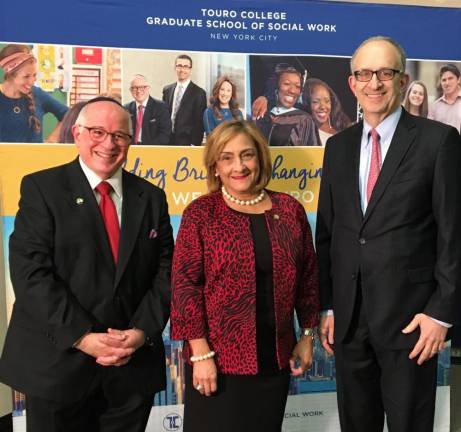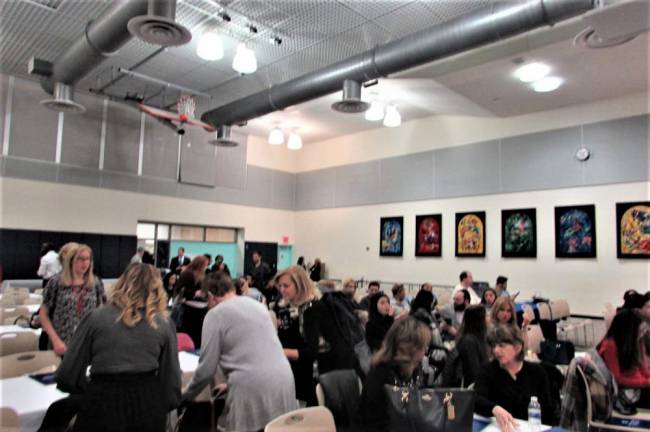“In New York State, an average of 9 people a day die from opioid overdose.” That was the cold truth delivered last week by Arlene Gonzales-Sanchez, commissioner of the New York State Office of Addiction Services and Supports. Gonzalez-Sanchez was taking part in a lecture series on the opioid crisis at Touro College’s Upper West Side campus, where some 200 students and alumni turned out to hear the speakers.
The event, titled, “Opioid Addiction - An International and Local Crisis and Epidemic: New Models of Prevention, Treatment and Recovery,” featured speakers who addressed the issue from their unique perspective and experience.
Touro recently received two financial awards to support its efforts in combating the ongoing epidemic. The first, for $1.33 million, is shared by the graduate school of social work and school of health sciences' clinical mental health counseling program. It’s part of the “Federal Opioid Workforce Expansion Program” and will help support 24 social work students and three clinical mental health counseling students.
The second grant, for $60,000, is designated for a new program called “Social Workers on the Front Line of the Opioid Epidemic Learning Collaborative,” and provides living expenses and training for up to eight students. “We’re consolidating everything we’ve been doing up until now, and building upon it with these new grant opportunities,” said Dr. Eric Levine, Touro’s director of social work alumni engagement and financial resource development.
Leading Cause of Unintentional Death
Following opening remarks from Touro President Dr. Alan Kadish and Graduate School of Social Work Dean Steven Huberman, Gonzales-Sanchez, addressed the very real effects that substance abuse (including opioids) have on New York State residents, and what her office has done to change that grim reality. “Opioids are the leading cause of unintentional death in New York State,” she said. In 2017, there were 3,264 opioid overdose deaths in the state.
The opioid epidemic has had a greater impact on some areas of New York City than others: according to the city health department, overdose rates in East Harlem, and in Crotona-Tremont and Hunts Point-Mott Haven in the South Bronx, were more than twice the citywide average in 2018. Gonzales-Sanchez explained exactly how disastrous that statistic is: in 2018, New York City saw 1,151 deaths from opioid overdose.
Marcia Jones, one of the Touro graduate students in the grant program, is currently working in the south Bronx. “I recognize that there’s a problem in my community,” she said. She worked for 15 years in child welfare, but after seeing the impact adult substance abuse has on the children in their lives, she was inspired to focus her experience and skills on addiction. “Things are happening around [the kids] and to them, and we’re not treating it as what it is,” she said.
The Science Behind the Scourge
Students selected for the grant programs are required to take special courses related to substance abuse. The funds support them in their field placements as social workers and clinical mental health professionals, as they work in teams with physicians, pharmacists, and nurses in the communities that are hit hardest by the epidemic.
Avi Feinsod, another one of the students receiving grant support, is currently placed at Samaritan Village, a human services agency that includes treatment for veterans struggling with substance abuse. He is part of a team that observes and guides them, through both group and individual programs. “The issue seemed unfortunately prevalent, it’s growing, it’s common in our communities,” he said. “There are reasons for substance abuse.”
Dr. Daniel Rosa, who followed Gonzales-Sanchez, addressed one of those reasons – neurobiology. Rosa is the senior medical director of Acacia Network, an organization that offers programs in substance abuse treatment. He walked the audience through the changes the brain goes through as addiction takes hold and worsens. “It’s a brain disease,” he said, “a loss of control, of impulse control.”
Addiction is not a moral choice, Rosa emphasized, and addicts should not be stigmatized or isolated from society. “You can’t just wait for them to die, “ he said. And it can happen to anyone. “It doesn’t matter who you are, if you have a brain, you’re vulnerable.”
Touro has been sponsoring events like opiod lectures for over a decade, said Allison Bobick, the program coordinator. “We always want to choose something that’s relevant, something that our social workers need to know, what’s going on in our community,” said Bobick. Unfortunately, in 2019, it’s the opioid epidemic.

